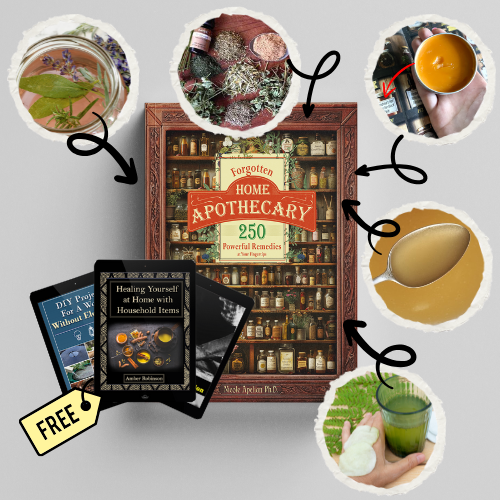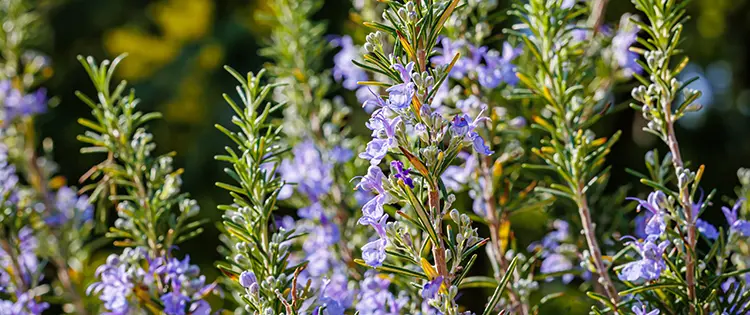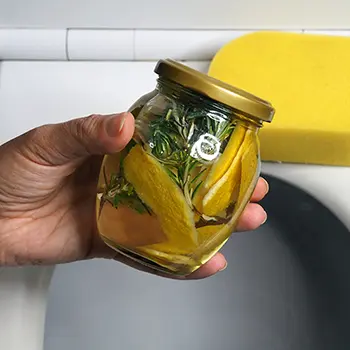Rosemary is a prized herb recognized for its culinary value. It infuses a distinct aroma to enhance the way food tastes. A sprig of rosemary completes the delectable flavor of lamb and steak, making it a staple herb for such recipes. But are there any household uses for rosemary?
There is so much more about rosemary than just cooking. It has an important repertory in the history of medicine. Rosemary has been a popular constituent in many tonics and liniments used for boosting memory. It can promote overall mental health and relieve other health problems too.
There are numerous reasons why you should incorporate rosemary into your diet. Outside of the kitchen, this seemingly common culinary herb has a plethora of other uses.
Household Uses of Rosemary
Pest Control
The pungent scent of rosemary can deter many of the notorious pests like mice, cabbage moths, flies, mosquitoes and other bugs. It works well during hot weather when pests are most active. All you have to do is place rosemary in various places around the house. Plant them in containers to make it easier for you to move them around. Or, you can harvest their leaves and throw them into the coal for the smoke to keep mosquitoes at bay.
But Rosemary isn’t the only plant that pulls double duty in the garden. Several medicinal herbs are just as valuable for their pest-repelling properties as they are for their healing uses. Growing them alongside your crops not only supports a more balanced ecosystem, but it also means fewer chemicals and fewer problems.
If you’re looking to add these kinds of plants to your garden, you can try out this Medicinal Garden Kit that makes it easy. It includes non-GMO, heirloom varieties like:
- California Poppy: Its strong scent can deter aphids and leafhoppers while attracting beneficial insects.
- Yarrow: Repels beetles and ants, while drawing in ladybugs and lacewings that feed on pests.
- Echinacea: It attracts pollinators and parasitic wasps that help keep pest populations in check.
- Calendula: Naturally deters nematodes and aphids and helps confuse whiteflies with its bright blooms.
- Chamomile: Deters mosquitoes and flies, and improves the health of neighboring plants.
- Marshmallow: Acts as a trap crop for pests like flea beetles, drawing them away from more vulnerable plants.
- Chicory: Its bitter compounds repel certain insects and it improves soil structure for plant health.
- Evening Primrose: Can deter some moth species and acts as a companion plant to reduce pest stress on nearby crops.
Planting a mix like this doesn’t just help repel pests. It strengthens your whole garden ecosystem, naturally.
Air Freshener
Get rid of the pungent odors in your home with rosemary leaves, vodka, and a few drops of essential oil. Rosemary air freshener is a green alternative to chemical air fresheners. You can use this anywhere in the house. It can battle even the worst smell in your bathroom and kitchen area.
To make your own rosemary air freshener, gather about half a cup of fresh rosemary sprigs. Add it to one cup of cheap vodka and let it infuse in a dark place. After at least two weeks, take the infusion and strain it into a 1-liter spray bottle. Top it up with water, add 5 to 10 drops of rosemary essential oil, and shake well before using.
Household Uses for Rosemary: All-Purpose Cleaner
Rosemary contains an ample amount of ursolic and rosmarinic acid, the compounds that inhibit microbial activity. Its powerful antibacterial, antifungal, and antiseptic properties make rosemary an excellent herb for a homemade cleaner.
Rosemary blends well with lemon and vinegar to create a potent but inexpensive all-natural surface cleaner. Combine two sprigs of rosemary, peels of 2 lemons or oranges, 2 cups water, and 2 cups white vinegar in a jar with a cover. Let it sit for 10 to 14 days to allow the oil to infuse. The longer the liquid is left, the stronger the aroma will become.
Strain the infusion and transfer it into a spray bottle for general-purpose cleaning. You may add fresh rosemary and lemon to the bottle before using it to intensify the fragrance.
Medicinal Properties
Rosemary has been used for centuries for its medicinal properties. It contains several compounds that have antioxidant and anti-inflammatory effects, which can support overall health and well-being.
You can harness the medicinal benefits of rosemary by making teas or infusions to alleviate indigestion, boost the immune system, relieve headaches, and promote relaxation. Additionally, rosemary oil is known for its stimulating properties and can be used in homemade salves or balms for muscle aches and pains.
And that’s just the start of it. There are so many simple, really powerful ways to use rosemary at home. Each one is easy to make, no special equipment or rare ingredients needed. 
💇♀️ Rosemary Hair Growth Spray: stimulates your scalp and fuels stronger, fuller hair growth. A must-have if you’re battling thinning hair, postpartum shedding, or just want to ditch the synthetic serums
🛡️ Anti-Viral Defense Oil – a skin-soothing, virus-fighting blend infused with rosemary and clove. Rub it into your chest or temples when you need a natural layer of defense — no lab-made chemicals required
🍃 Immuni-Tea Tonic – a fragrant, immunity-boosting tea steeped with rosemary and elderflower. Keeps your body strong and clear-headed when cold season hits hard
🔥 Grandma’s Back Pain Hot Salve – a fiery herbal rub that sinks deep into tight muscles and aching joints. Powered by rosemary and cayenne, it brings fast relief without reaching for the pill bottle
💊 Amish Ibuprofen – a potent blend of rosemary and wild herbs to ease pain, swelling, and tension. Works like the pharmacy stuff — but safer, cleaner, and homestead-approved
🧠 Brain Booster Tincture – crafted to sharpen focus and clear mental fog with the cognitive firepower of rosemary. A go-to when your mind needs a serious pick-me-up
🧬 Memory Elixir – made with fresh rosemary to help restore clarity, concentration, and short-term memory. Ideal for staying sharp as the years roll on.
And that’s just the beginning.
This book may be the only thing standing between you and full pharmaceutical dependence in a time of crisis.
 Click here to get The Forgotten Home Apothecary before it’s gone. Limited edition. Real remedies. No chemicals.
Click here to get The Forgotten Home Apothecary before it’s gone. Limited edition. Real remedies. No chemicals.
Household Uses for Rosemary: Pollinator Attraction
Maintaining a healthy ecosystem on the homestead is essential, and rosemary can play a role in attracting beneficial pollinators. Its vibrant flowers are highly attractive to bees, butterflies, and other pollinating insects, supporting their population and promoting pollination in the garden.
By planting rosemary strategically in the garden, homesteaders can create a welcoming environment for these pollinators, which, in turn, helps with the pollination of other crops and enhances overall biodiversity.
Rosemary Salt
Turn an ordinary dish into a gourmet meal using flavored salt. Rosemary salt is a great spice for meat, poultry, and practically any food that needs an upgrade. You can make one at home by pulsing 1 cup coarse sea salt, 3 tbsp rosemary leaves, and lemon zest in a food processor. Spread them on a baking sheet and bake in low heat for 15 minutes to dry.
Household Uses for Rosemary: Skewers
Here is another unconventional use of rosemary: turn it into a natural barbecue skewer. This creative idea highlights one of the many household uses for rosemary.
It will not only hold the grilled pieces but also infuse its delectable flavor as it cooks. Use a fresh plant long enough to handle the food and insert it in a pre-bored hole in meats or veggies.
Rosemary Tincture
The best and most potent form of rosemary is in its tincture form. It can be used in many ways, from soothing an upset stomach, enhancing the mood, or alleviating pain and illnesses. Traditionally, men used it for enhancing beard growth just as women used it for keeping their hair healthy.
Keep a bottle of rosemary tincture handy anytime you need its therapeutic benefits with these simple ingredients: 1 cup fresh rosemary (1/2 cup if using dried) and 1 cup 80-proof vodka (40% alcohol)
Chop and lightly crush rosemary leaves, then place them in a clean glass jar. Pour in vodka to cover the leaves completely. Cover the jar and put it in a dark and cool place to infuse, shaking the jar regularly. After 4 to 6 weeks, take out the jar and strain the tincture with a fine sieve into a sterilized jar. Store the tincture in a cabinet.
Rosemary tincture can last for about 5 years when stored properly. If you want an alcohol-free tincture, you may use vegetable glycerin or apple cider vinegar instead of vodka.
This is an indispensable herb for homesteaders, offering many household uses for rosemary. From enhancing the flavor of homemade meals to offering medicinal benefits, acting as a natural pest repellent, and providing a fragrant air freshener, rosemary brings a multitude of advantages to the household while promoting a sustainable and self-sufficient lifestyle.
You may also like:
10 Cooking Herbs You Should Grow In Your Garden
The Herbs You Need to Keep Close During Dark Times (Video)

















